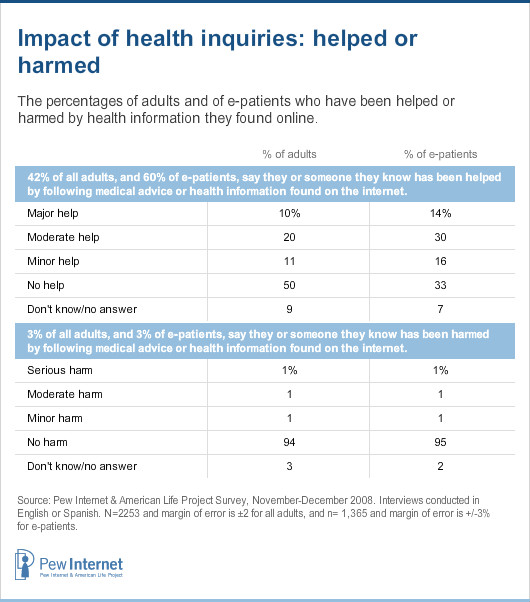About one in ten online health inquiries have a major impact on someone’s health care or the way they care for someone else.
When asked, “Did the health information you found in the last time online have a major impact on your own health care or the way you care for someone else, a minor impact, or no impact at all?”
- 13% of e-patients say their most recent inquiry had a major impact.
- 44% of e-patients say it had a minor impact.
- 41% of e-patients say their most recent inquiry had no impact.
There are no differences between men and women or among age groups when it comes to the impact of online health inquiries. African American e-patients are more likely than white or Latino e-patients to report that their last online health session had a major impact (26%, compared with 11% and 16%). Seventeen percent of e-patients who report their health status as excellent or good say their most recent online health inquiry had a major impact, compared with 6% of those who report being in fair or poor health.
For the 57% of e-patients who say their most recent search had an impact, either major or minor:
- 60% say the information found online affected a decision about how to treat an illness or condition.
- 56% say it changed their overall approach to maintaining their health or the health of someone they help take care of.
- 53% say it lead them to ask a doctor new questions, or to get a second opinion from another doctor.
- 49% say it changed the way they think about diet, exercise, or stress management.
- 38% say it affected a decision about whether to see a doctor.
- 38% say it changed the way they cope with a chronic condition or manage pain.
The Center for Studying Health System Change’s large survey sample of 18,000 respondents afforded an opportunity to look closely at the impact of health information searches. Their data showed that African American and Latino information seekers were more likely than whites to say that “the information had a beneficial impact on their knowledge about treating an illness or condition.”21 Further study is needed to determine the reasons, but one factor cited by the study’s authors is that African American and Latino consumers are less likely than whites to have a usual doctor or other care provider and therefore “may find information obtained from other sources has more impact on their health knowledge or behaviors.” The Pew Hispanic Center and Robert Wood Johnson Foundation have also recorded lower levels of access to usual health care providers among Latinos in the U.S.22
42% of adults say they or someone they know has been helped by online health advice.
In this survey, 42% of all adults, or 60% of e-patients, say they or someone they know has been helped by following medical advice or health information found on the internet. This represents a significant increase since 2006 when 25% of all adults, or 31% of e-patients, reported being aware of helpful outcomes.
Just 3% of all adults, or 3% of e-patients, say they or someone they know has been harmed by following medical advice or health information found on the internet. This is the same percentage who reported being aware of harmful outcomes in 2006.

Looking online for health information is a mainstream activity, but few people are engaged daily or even weekly with online health resources.
83% of internet users, or 61% of adults, look online for health information, however:
- 81% of internet users say they go online and do something related to health less often than once a week.
-
9% of internet users say they do so once a week.
-
6% of internet users say they do so every few days.
-
4% of internet users say they go online and do something related to health once a day or more.
This should not be surprising since 80% of American adults describe their health as excellent or good and therefore have little reason to frequently access health information.




